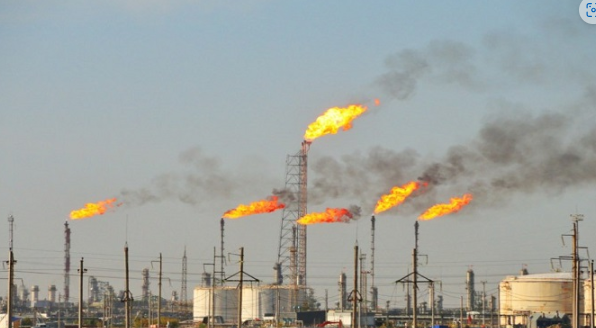Infostride News reports that Nigeria is grappling with substantial financial gaps in the gas sector, as disclosed by the Nigerian Extractives Industries Transparency Initiative (NEITI). Dr. Orji Ogbonnaya Orji, the Executive Secretary of NEITI, unveiled these staggering figures during the 2nd German-Nigerian Symposium on Green Hydrogen in Abuja on November 13.
Despite Nigeria’s status as a significant global gas producer, the persistent issue of gas flaring poses a threat to the nation’s ambitious Decade of Gas agenda. According to the 2021 NEITI report, an alarming $559.8 million in unpaid gas royalties and an additional $828.8 million related to outstanding gas flare penalties have yet to be reconciled.
This revelation underscores a crucial challenge to the global zero emissions initiative, as substantial amounts of gas were reportedly flared during the specified period without corresponding payments. The consequences of this practice not only hinder the economic potential of the gas sector but also pose environmental and sustainability concerns.

This issue is not new, as Infostride News previously reported in July 2023 that Nigeria experiences an annual loss of $2.5 billion due to gas flaring. Hon. Tajudeen Abass, the Speaker of Nigeria’s Federal House of Representatives, stressed that the flared gas represents missed opportunities for revenue generation through sales or alternative utilization.
To address this ongoing problem, Abass advocated for the engagement of all stakeholders involved in gas flaring activities through the Ad-hoc gas flaring committee. The objective is to thoroughly investigate the payment of fines and the management of proceeds to ensure transparency and accountability in the industry.
Providing additional insights, Patrick Mgbebu, the Chairman of the Gas Monitoring Committee at the Revenue Mobilization Allocation and Fiscal Commission (RMAFC), informed the House that the Federation Account suffered a loss of over $277 million in gas flaring penalties between 2020 and 2022.
The Hydrogen conference, where Dr. Orji made these remarks, delved into the transformative potential of green hydrogen in revolutionizing Nigeria’s energy landscape. Dr. Markus Wagner, the Country Director of GIZ Nigeria & ECOWAS, emphasized the significance of green hydrogen in reducing carbon emissions, diversifying energy sources, and fostering economic growth.
Dr. Wagner stressed the importance of data and information in facilitating a successful energy transition in Nigeria. He advocated for comprehensive planning, monitoring, and evaluation of implementation plans as essential elements for navigating the transition effectively. Furthermore, he suggested that Nigeria should position itself as a technology leader to fully capitalize on the opportunities presented by the energy transition journey.
Nigeria’s Minister of Gas, Ekperikpe Ekpo, represented by the Director of Gas, Mrs. Komolafe Oluremi, reiterated the country’s commitment to achieving Net Zero Emission by 2060. Ekpo emphasized that hydrogen offers a viable pathway for decarbonizing the country’s energy sector and has become a top priority for the Ministry of Petroleum Resources.
Highlighting the need for substantial investments to scale up the hydrogen economy, Ekpo indicated that the government can play a pivotal role in creating a conducive climate for investors. This aligns with the broader vision of Ambassador Annett Günther, representing the Federal Republic of Germany in Nigeria, who affirmed the commitment of both Germany and Nigeria to drive the production and utilization of hydrogen.
The collaborative efforts between Germany and Nigeria in advancing hydrogen-related initiatives reflect a shared dedication to addressing environmental concerns, fostering sustainable energy practices, and unlocking the economic potential of the hydrogen economy. As the nations work together, it is anticipated that these initiatives will contribute significantly to Nigeria’s energy transition and global sustainability efforts.
Support InfoStride News' Credible Journalism: Only credible journalism can guarantee a fair, accountable and transparent society, including democracy and government. It involves a lot of efforts and money. We need your support. Click here to Donate
